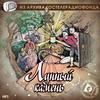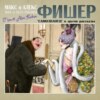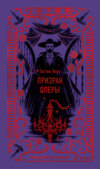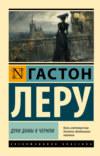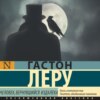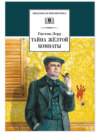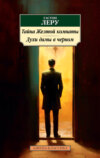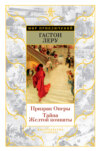Kitobni o'qish: «The Man with the Black Feather»
HISTORICAL PREFACE THE SANDALWOOD BOX
One evening last year I perceived in the waiting-room of my newspaper, Le Matin, a man dressed in black, his face heavy with the darkest despair, whose dry, dead eyes seemed to receive the images of things like unmoving mirrors.
He was seated; and there rested on his knees a sandalwood box inlaid with polished steel. An office-boy told me that he had sat there motionless, silent, awaiting my coming, for three mortal hours.
I invited this figure of despair into my office and offered him a chair. He did not take it; he walked straight to my desk, and set down on it the sandalwood box.
Then he said to me in an expressionless, far-away voice: "Monsieur, this box is yours. My friend, M. Theophrastus Longuet, charged me to bring it to you."
He bowed and was going to the door, when I stopped him.
"For goodness sake, don't run away like that!" I said sharply. "I can't receive this box without knowing what it contains."
"I don't know what it contains myself," he said in the same dull, expressionless tone. "This box is locked; the key is lost. You will have to break it open to find out."
"At any rate I should like to know the name of the bearer," I said firmly.
"My friend, M. Theophrastus Longuet, called me 'Adolphe,'" he said in the mournfullest tone.
"If M. Theophrastus Longuet had brought me this box himself, he would certainly have told me what it contains," I said stiffly. "I regret that M. Theophrastus Longuet—"
"So do I," said my visitor. "M. Theophrastus Longuet is dead; and I am his executor."
With that he opened the door, went through it, and shut it behind him. I stared at the sandalwood box; I stared at the door; then I ran after the man. He had vanished.
I had the sandalwood box opened; and in it I found a bundle of manuscripts. In a newspaper office one is used to receiving bundles of manuscripts; and I began to look through them with considerable weariness. Very soon it changed to the liveliest interest. As I went deeper and deeper into these posthumous documents I found the story related in them more and more extraordinary, more and more incredible. For a long while I disbelieved it. However, since the proofs of it exist, I ended, after a searching inquiry into them, by believing it to be true.
M. Theophrastus Longuet's reason for bequeathing this strange legacy to me was itself strange. He did not know me; but he had read articles by me in Le Matin, "his favourite organ"; and among the many contributors to that journal he had chosen me, not for my superior knowledge, an allegation which would have made me blush, but because he had come to the conclusion that I possessed "a more solid intellect" than the others.
Gaston Leroux
CHAPTER I
M. THEOPHRASTUS LONGUET DESIRES TO IMPROVE HIS MIND AND VISITS HISTORICAL MONUMENTS
M. Theophrastus Longuet was not alone when he rang the bell of that old-time palace prison, the Conciergerie: he was accompanied by his wife Marceline, a very pretty woman, uncommonly fair for a Frenchwoman, of an admirable figure, and by M. Adolphe Lecamus, his best friend.
The door, pierced by a small barred peephole, turned heavily on its hinges, as a prison door should; the warder, who acts as guide to the prison, dangling a bunch of great old-fashioned keys in his hand, surveyed the party with official gloom, and asked Theophrastus for his permit. Theophrastus had procured it that very morning at the Prefecture of Police; he held it out with the air of a citizen assured of his rights, and regarded his friend Adolphe with a look of triumph.
He admired his friend almost as much as he admired his wife. Not that Adolphe was exactly a handsome man; but he wore an air of force and vigour; and there was nothing in the world which Theophrastus, the timidest man in Paris, rated more highly than force and vigour. That broad and bulging brow (whereas his own was narrow and high), those level and thick eyebrows, for the most part raised a trifle to express contempt of others and self-confidence, that piercing glance (whereas his own pale-blue eyes blinked behind the spectacles of the short-sighted), that big nose, haughtily arched, those lips surmounted by a brown, curving moustache, that strong, square chin; in a word, all that virile antithesis to his own grotesque, flabby-cheeked face, was the perpetual object of his silent admiration. Besides, Adolphe had been Post-Office Inspector in Tunis: he had "crossed the sea."
Theophrastus had only crossed the river Seine. No one can pretend that that is a real crossing.
The guide set the party in motion; then he said:
"You are French?"
Theophrastus stopped short in the middle of the court.
"Do we look like Germans?" he said with a confident smile, for he was quite sure that he was French.
"It's the first time I ever remember French people coming to visit the Conciergerie. As a rule French people don't visit anything," said the guide with his air of official gloom; and he went on.
"It is wrong of them. The monuments of the Past are the Book of History," said Theophrastus sententiously; and he stopped short to look proudly at his wife and Adolphe, for he found the saying fine.
They were not listening to him; and as he followed the guide, he went on in a confidential tone, "I am an old Parisian myself; and if I have waited till to-day to visit the monuments of the Past, it was because my business—I was a manufacturer of rubber stamps right up to last week—did not give me the leisure to do it till the hour I retired from it. That hour has struck; and I am going to improve my mind." And with an air of decision he struck the time-old pavement with the ferule of his green umbrella.
They went through a little door and a large wicket, down some steps, and found themselves in the Guard-room.
They were silent, abandoning themselves entirely to their reflections. They were doing all they could to induce these old walls, which recalled so prodigious a history, to leave a lasting impression on their minds. They were not insensible brutes. While the guide conducted them over Cæsar's tower, or Silver tower, or Bon Bec tower, they told themselves vaguely that for more than a thousand years there had been in them illustrious prisoners whose very names they had forgotten. Marceline thought of Marie Antoinette, the Princess Elizabeth, and the little Dauphin, and also of the waxwork guards who watch over the Royal Family in museums. In spirit therefore she was in the Temple while she was in body visiting the Conciergerie. But she did not suspect this; so she was quite happy.
As they descended the Silver tower, where the only relict of the Middle Ages they had found was an old gentleman on a stool in front of a roll-top desk, classifying the documents relating to political prisoners under the Third Republic, they came once more into the Guard-room on their way to Bon Bec tower.
Theophrastus, who took a pride in showing himself well-informed, said to the guide: "Wasn't it here that the Girondins had their last meal? You might show us exactly where the table was and where Camille Desmoulins sat. I always look upon Camille Desmoulins as a personal friend of mine."
"So do I," said Marceline with a somewhat superior air.
Adolphe jeered at them. He asserted that Camille Desmoulins was not a Girondin. Theophrastus was annoyed, and so was Marceline. When Adolphe went on to assert that Camille Desmoulins was a Cordelier, a friend of Danton, and one of the instigators of the September massacres, she denied it.
"He was nothing of the kind," she said firmly. "If he had been, Lucie would never have married him."
Adolphe did not press the point, but when they came into the Torture-chamber in Bon Bec tower, he pretended to be immensely interested by the labels on the drawers round the walls, on which were printed "Hops," "Cinnamon," "Senna."
"This was the Torture-chamber; they have turned it into a dispensary," said the guide in gruff explanation.
"They have done right. It is more humane," said Theophrastus sententiously.
"No doubt; but it's very much less impressive," said Adolphe coldly.
At once Marceline agreed with him…
One was not impressed at all… They had been expecting something very different… This was not at all what they had looked for.
But when they came on to the Clock platform, their feelings underwent a change. The formidable aspect of those feudal towers, the last relics of the old Frankish monarchy, troubles for awhile the spirit of even the most ignorant. This thousand-year-old prison has witnessed so many magnificent death-agonies and hidden such distant and such legendary despairs that it seems that one only has to penetrate its depths to find sitting in some obscure corner, damp and fatal, the tragic history of Paris, as immortal as those walls. That is why, with a little plaster, flooring, and paint, they have made there the office of the Director of the Conciergerie and that of the Recorder; they have put the ink-spiller in the place once occupied by the executioner. It is, as Theophrastus says, more humane.
None the less, since, as Adolphe affirmed, it is less impressive, that visit of the 16th of last June threatened to leave on the minds of the three friends nothing but the passing memory of a complete disillusion when there happened an incident so unheard of and so curiously fantastic that I considered it absolutely necessary, after reading Theophrastus Longuet's account of it in his memoirs, to go to the Conciergerie and cross-examine the guide himself.
I found him a stolid fellow, officially gloomy, but with his memory of the events of Theophrastus' visit perfectly clear.
At my questions he lost his air of gloom, and said with some animation, "Everything was going quite as usual, sir; and I had just shown the two gentlemen and the lady the kitchens of St. Louis—where we keep the whitewash. We were on our way to the cell of Marie Antoinette, which is now a little chapel. The figure of Christ before which she must have prayed is now in the Director's office—"
"Yes, yes; let's get to the facts!" I interrupted.
"We're just coming to them. I was telling the gentleman with the green umbrella that we had been compelled to put the Queen's armchair in the Director's office because the English were carrying away all the stuffing of it in their purses—"
"Oh, cut out the English!" I said with some impatience.
He looked at me with an injured air and went on: "But I must tell you what I was saying to the gentleman with the green umbrella when he interrupted me in such a strange tone that the other gentleman and the lady cried out together, 'What's the matter, Theophrastus? I never heard you speak like that before! I shouldn't have recognised your voice!'"
"Ah! and what was he saying to you?"
"We had come just to the end of Paris Street—you know the passage we call Paris Street at the Conciergerie?"
"Yes, yes: get on!"
"We were at the top of that dreadful black passage where the grating is behind which they used to cut off the women's hair before guillotining them. It's the original grating, you know."
"Yes, yes: get on!"
"It's a passage into which a ray of sunlight never penetrates. You know that Marie Antoinette went to her death down that passage?"
"Yes, yes: cut out Marie Antoinette!"
"There you have the old Conciergerie in all its horror… Then the gentleman with the green umbrella said to me, 'Zounds! It's Straw Alley!'"
"He said that? Are you sure? Did he really say 'Zounds'?"
"Yes, sir."
"Well, after all, there's nothing very remarkable in his saying, 'Zounds! It's Straw Alley!'"
"But wait a bit, sir," said the guide with yet more animation. "I answered that he was wrong, that Straw Alley was what we to-day call 'Paris Street.' He replied in that strange voice: 'Zounds! Are you going to teach me about Straw Alley? Why, I've slept on the straw there, like the others!' I said laughing, though I felt a bit uncomfortable, that no one had slept in Straw Alley for more than two hundred years."
"And what did he say to that?"
"He was going to answer when his wife interfered and said: 'What are you talking about, Theophrastus? Are you going to teach the guide his business when you've never been to the Conciergerie before in your life?' Then he said, but in his natural voice, the voice in which he had been speaking since they came in: 'That's true. I've never been to the Conciergerie in my life.'"
"What did he do then?"
"Nothing. I could not explain the incident, and I thought it all over, when something stranger still happened. We had visited the Queen's cell, and Robespierre's cell, and the chapel of the Girondins, and that little door through which the prisoners of September went to get massacred in the court; and we had come back into Paris Street. On the left-hand side of it there's a little staircase which no one ever goes down, because it leads to the cellars; and the only thing to see in the cellars is the eternal night which reigns there. The door at the bottom of this is made of iron bars, a grating—perhaps a thousand years old, or even more. The gentleman they called Adolphe was walking with the lady towards the door of the Guard-room, when without a word the gentleman with the green umbrella ran down the little staircase and called up from the bottom of it in that strange voice I was telling you about:
"'Hi! Where are you going to? It's this way!'
"The other gentleman, the lady, and myself stopped dead as if we had been turned to stone. I must tell you, sir, that his voice was perfectly awful; and there was nothing in his appearance to make one expect such a voice. I ran, in spite of myself as it were, to the top of the staircase. The man with the green umbrella gave me a withering glance. Truly I was thunderstruck, turned to stone and thunderstruck; and when he shouted to me, 'Open this grating!' I don't know how I found the strength to rush down the stairs and open it. Then, when the grating was opened, he plunged into the night of the cellars. Where did he go? How did he find his way? That basement of the Conciergerie is plunged in a terrible darkness which nothing has broken for ages and ages."
"Didn't you try to stop him?" I said sharply.
"He had gone too far; and I hadn't the strength to stop him. The man with the green umbrella just gave me orders; and I had to obey him. And we stood there for a quarter of an hour, half out of our wits: it was so odd. And his wife talked, and his friend talked, and I talked; and we said nothing of any use; and we stared into the darkness till our eyes ached. Suddenly we heard his voice—not his first voice, but his second voice, the awful voice—and I was so overcome, I had to hang on to the bars of the door.
"'Is that you, Simon the Auvergnat?' he cried.
"I didn't answer anything; and as he went past me, I fancied he put a scrap of paper into his breast pocket. He sprang up the staircase three steps at a time; and we went up after him. He did not offer any explanation; and I simply ran to open the door of the prison for them. I wanted to see their backs. When the wicket was opened and the man with the green umbrella was crossing the threshold, he said, for no reason that I could see:
"'We must avoid the wheel.'
"There was no carriage passing."
CHAPTER II
THE SCRAP OF PAPER
What did happen? The matter is very obscure. I cannot do better than give Theophrastus Longuet's account of it in the actual words of his memoirs in the sandalwood box.
"I am a man with a healthy mind in a healthy body," he writes, "and a good citizen: that is, I have never transgressed the law. Laws are necessary; and I have always kept them. At least I believe I have.
"I have always hated the imagination; and by that I mean that in all circumstances, whether, for instance, it has been a case of conferring my friendship on anyone, or of having to decide on a line of conduct, I have always been careful to stick to common sense. The most simple always seemed to me the best.
"I suffered deeply, for instance, when I discovered that my old College friend Adolphe Lecamus was addicted to the study of Spiritualism.
"The man who says Spiritualism says rubbish. To try to question spirits by turning tables is utterly absurd. I know what I am talking about, for, wishing to prove the absurdities of his theories, I have taken part in séances with Adolphe and my wife. We sat for hours round a little table which absolutely refused to turn. I laughed at him heartily; and that annoyed my wife, because women are always ready to put faith in the impossible and believe in the mysterious.
"He used to bring her books which she read greedily; and sometimes he would amuse himself by trying to send her to sleep by making passes before her face. I have never seen anything sillier. I should not indeed have stood it from anyone else; but I have a strong liking for Adolphe. He has a powerful face; and he has been a great traveller.
"He and Marceline called me a sceptic. I answered that I was not a sceptic in the sense of a man who believes in nothing or doubts everything. I believe in everything worthy of belief; for example, I believe in Progress. I am not a sceptic; I am a philosopher.
"During his travels Adolphe read a great deal; I manufactured rubber stamps. I am what people call 'an earthy spirit.' I do not make a boast of it; I merely state it.
"I thought it well to give this sketch of my character to make it clear that what happened yesterday is no fault of mine. I went to see the prison as I might have gone to buy a neck-tie at the Louvre. I wished to improve my mind. I have plenty of spare time nowadays, since we have sold the business. I said, 'Let us do as the English do and see the sights of Paris.' It was a mere chance that we began with the Conciergerie.
"I am very sorry indeed that we did.
"Am I really very sorry? I am not sure. I am not sure of anything. At present I am quite calm. And I am going to write down what happened exactly as if it had happened to someone else. All the same, what a story it is!
"While we were going through the towers nothing happened worth setting down here. I remember saying to myself in Bon Bec tower:
"'What, was it here in this little chamber, which looks just like a grocery, that there were so many agonies and so many illustrious victims martyred?'
"I tried honestly to picture to myself the horror of that chamber when the executioner and his assistants with their horrible instruments came to the prisoners with the intention of forcing them to confess crimes affecting the state. But owing to the little labels on the drawers, on which one reads 'Senna,' 'Hops,' I did not succeed.
"That Bon Bec tower! They used also to call it The Prattler on account of the horrible cries which burst from it and made the quiet passer-by shudder and quicken his steps along the quay at the sound of the King's justice.
"Now Bon Bec tower is peaceful and very still. I am not complaining of it: it is Progress.
"But when we penetrated to that part of the Conciergerie which has hardly changed for centuries and were walking quietly along between those bare stone walls which no fresh facing, no profane plaster has ever covered, an inexplicable fever began to fill my veins; and when we were in the gloom at the end of Straw Alley, I cried, 'Zounds! It's Straw Alley!'
"At once I turned to see who had spoken those words. They were all staring at me; and I perceived plainly that I had spoken them myself. Indeed, my throat was still quivering from their utterance.
"The idiot of a guide asserted that we had passed Straw Alley. I contradicted him; and he shut up. I was sure of my facts, you understand, quite sure that it was Straw Alley. I told him that I had slept on the straw in it. But it is absurd. How do you suppose I could have slept on straw in Straw Alley when it was the first time I had ever been in the Conciergerie? Besides, was I sure? That is what worries me. I had an atrocious headache.
"My brow was burning even while I felt it swept by a strong current of cold air. Outside I was cool; inside I was a furnace.
"What had we been doing? I had a moment before walked quietly through the chapel of the Girondins; and while the guide was telling us the history of it, I played with my green umbrella. I was not in the least annoyed at having just behaved so oddly. I was my natural self. But as for that, I have never ceased to be my natural self.
"That which befell me later was also quite natural, since it was not the result of any effort. The unnatural is exactly what did not befall me.
"I remember finding myself at the bottom of a staircase in front of a grating. I was endowed with superhuman vigour; I shook the grating and shouted, 'This way!' The others, who did not know, were slow coming. I do not know what I should have done to the grating, if the guide had not unlocked it for me. For that matter, I do not know what I should have done to the guide. I was mad. No: I have no right to say that. I was not mad; and that's a great pity. It is worse than if I had been mad.
"Undoubtedly I was in a state of great nervous excitement; but my mind was quite lucid. I do not believe that I have ever seen so clearly; and yet I was in the dark. I do not believe that I have ever had clearer recollections; and yet I was in a place I did not know. Heavens! I did not recognise it and I did recognise it! I did not hesitate about my way. My groping hands found the stones they reached out in the darkness to find; and my feet trod a soil which could not have been strange to them.
"Who will ever be able to tell the age of that soil; who will ever be able to tell you the age of those stones? I do not know it myself. They talk of the origin of the palace. What is the origin of the old Frankish palace? They may be able to say when those stones will end; they will never be able to say when they began. And they are forgotten, those stones, in the thousand-year night of the cellars. The odd thing is that I remembered them.
"I crept along the damp walls as if the way were well known to me. I expected certain rough places in the wall; and they came to the tips of my fingers; I counted the edges of the stones and I knew that at the end of a certain number I had only to turn to see at the far end of a passage a ray which the sun had forgotten there since the beginning of the history of Paris. I turned and saw the ray; and I felt my heart beat loudly from the bottom of the centuries."
M. Longuet interrupts his narrative for a while to describe the whirl of his mind during this singular hour. He has the greatest difficulty in remaining master of his thought, the utmost difficulty in following it. It rushes on in front of him like a bolting horse whose reins he has let go. It leaves him behind and bounds ahead, leaving on the paper, as traces of its passage, words of such profundity that when he looks at them, he says, they make him giddy.
And he adds, in a paroxysm of dread:
"One must stop on the edge of these words as one stops on the edge of a precipice."
And he guides the pen with a feverish hand, as he goes on burying himself in the depths of these subterranean galleries:
"And that's the Prattler! These are the walls which have heard! It was not up above, in the sunlight, that the Prattler spoke; it was here, in this night of the underworld. Here are the rings in the walls. Is it the ring of Ravaillac? I no longer remember.
"But towards the ray, towards the unique ray, motionless and eternal, the faint, square ray, which from the beginning of ages took and preserved the form of the air-hole, I advance; I advance in a stumbling hurry, while the fever consumes me, blazes, and dizzies my brain. My feet stop, but with such a shock that one would believe them caught by invisible hands, risen from the soil; my fingers run over the wall, groping and fumbling that spot in the wall. What do my fingers want? What is the thought of my fingers? I had a pen-knife in my pocket; and all at once I let my green umbrella fall to the ground to take my pen-knife from my pocket. And I scraped, with certainty, between two stones. I cleared away the dust and mortar from between two stones. Then my knife pierced a thing between the two stones and brought it out.
"That is why I know I am not mad. That thing is under my eyes. In my quietest hours, I, Theophrastus Longuet, can look at it on my desk between my latest models of rubber stamps. It is not I who am mad; it is this thing that is mad. It is a scrap of paper, torn and stained—a document whose age there is no telling and which is in every way calculated to plunge a quiet manufacturer of rubber stamps into the wildest consternation. The paper, as you can guess, is rotted by the damp of the cellars. The damp has eaten away half the words, which seem from their red hue to have been written in blood.
"But in these words before me, in this document which was certainly written two centuries ago, which I passed under the square ray from the air-hole and gazed at with my hair rising on end in horror, I recognised my own handwriting."
Here copied clearly out is this precious and mysterious document:
"I rt uried
my treasures after betrayal
of April 1st
Go and take the air
at the Chopinettes
look at the Gall
look at the Cock
Dig on the spot and you
will be rich."





